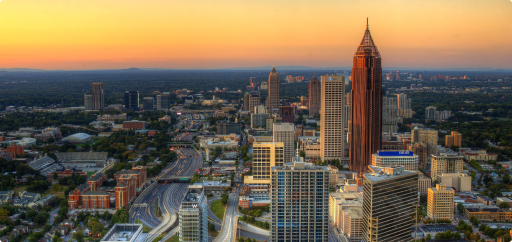A Leader Since 1977
Shortly after Griffin Bell was confirmed as Attorney General of the United States in the winter of 1977, he launched a national experiment to test the usefulness of mediation and arbitration for minor disputes. Judge Bell called this effort “The Neighborhood Justice Centers” after the concept first discussed by Professor Frank Sander of Harvard Law School.
Professor Sander’s idea was that people, given the choice to go to a mediation/arbitration center in their neighborhood, would do so and get faster, less expensive, and equally as good, if not fairer resolutions than courts would provide. Along with these goals, relief of the overburdened courts was a prime motivating factor.

Three Centers
Three centers across the nation were funded by the now defunct Law Enforcement Assistance Administration (LEAA) at the U.S. Department of Justice. They were set up in Los Angeles, California; Kansas City, Missouri; and Atlanta. The three centers all went by the name “Neighborhood Justice Center.” All were given identical funding. Uniquely, the grant also paid for an ongoing evaluation as the centers’ programs rolled out, rather than after the fact.
The Bar Association of Los Angeles governed their center and the Kansas City program was made a part of the city government. Atlanta’s program chose to become a private, non-profit, 501 (c)(3) organization.
History
After a year, Atlanta had handled 1,200 cases, three times as many as Los Angeles and twice as many at Kansas City. This fact was a direct result of Atlanta’s abandoning the idea that only problems in its surrounding neighborhoods would be mediated. The staff of Atlanta’s program went to the Fulton County court system to offer its services. With the help and encouragement of the judges, cases began to be referred.
Since March of 1978 when the Center held its first mediation, well over 95,000 cases have been handled ranging geographically from all over the metropolitan area to state, national, and international sites. Fulton County courts remain our largest local referral agency. However, over a five year period, the Center handled 4,000 mediations for the U.S. Postal Service in five states, mediating nearly 2,000 such cases in one year alone! The Center’s customers include not only these local court systems and USPS, but school systems, and federal agencies including, among others, the U.S. Department of Defense, the United States Department of Agriculture, The United States Fish and Wildlife Services, the U.S. Department of Energy/Oak Ridge and Savannah River sites, the EEOC Atlanta District Office, the U.S. Department of State, and the U.S. Department of Homeland Security.
Cases handled by the Center’s mediators, most of whom are independent contractors, range from small claims and misdemeanor criminal conflicts to personal injury, breach of contract, real estate, probate, educational, and employment/EEO matters. Some of our most well-know mediations involved the lawsuit Jan Kemp filed against the University of Georgia; President Carter’s Presidential Center’s dispute with CAUTION – 24 neighborhoods which had sued to stop the building of a road through their neighborhoods to the Carter Presidential Library; the Druid Hills neighborhood coalition’s threatened boycott of The Emory Village CVS drugstore when it announced it was opening a store in the building that Kroger had decided not to lease again; several class action matters involving the Dalkon Shield claims, the breast implant disputes; and employment discrimination claims filed by women at Merrill Lynch and Smith Barney brokerage firms.
The Center’s training team has earned a national reputation and has taught the mediation process to thousands of people living in the United States, Western Europe, Korea, and Japan.
For obvious reasons, the Center dropped “Neighborhood” from its name in 1987.


